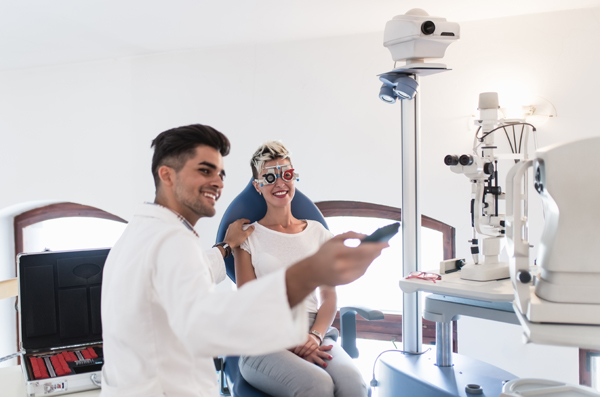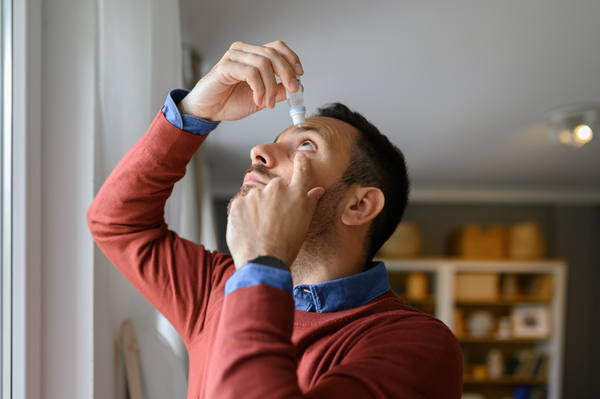What to Expect During an Eye Exam

If you have never had an eye exam before, then you may be a little nervous and not know what to expect on your first visit to the optometrist. By gaining a full understanding of what an eye exam consists of, then you can stay calm and remain confident on the day of the examination.
How an eye exam works
Although each eye exam may be slightly different depending on the optometrist and the patient’s exact needs, there are certain tasks that are a part of almost every eye exam. The following is a three-step process that most medical professionals follow when conducting an eye exam.
Determine medical history
The first step in the eye exam process is for the examiner to document the patient’s medical history, discussing anything relevant to eye health and any eye complications that the patient may have recently experienced. The patient is likely to be asked a series of questions, which may include inquiries about any family members who have developed an eye disease in the past, if the patient is currently suffering from any eye conditions and more general questions about their overall health. This knowledge allows the examiner to gain a better understanding as to what exact eye exam tests are needed.
Eye exam tests
The eye exam tests performed may be different for each patient, but there are some that are more common. Almost every eye exam includes what is known as a visual acuity test, which measures the sharpness of the patient’s vision. Most people are familiar with and have received this form of exam - which often uses the famously known wall chart that contains various rows of letters. A tonometry - which measures the pressure in the eyes - is also a common procedure. In many instances, a pupil dilation test may be performed as well in order to see the internal structure of the eyes more clearly.
Evaluation and treatment
After the testing is complete and the results are available, the medical professional conducting the eye exam is likely to go over the results with the patient. If any eye complications were determined, she or he may recommend treatment to the patient, which can range from contacts or glasses to treatment for glaucoma and other more serious eye conditions. In the event that the patient’s eyes are healthy, the medical professional is likely to discuss preventive techniques to ensure a healthy eye exam on the next visit as well; these suggestions may include lifestyle or diet changes.
Schedule an eye exam today
It is important to receive consistent eye exams, regardless of if you experience any eye issues or not. The symptoms of many serious eye conditions can go unnoticed for a long time and cause the issue to be much harder to treat when more noticeable symptoms develop. A skilled optometrist is able to identify the earliest signs of eye disease and other serious eye complications, in addition to helping patients see and feel better every day. If you are in need of an eye exam, then feel free to consult with us today and schedule a time to come in for a visit.
Request an appointment here: https://www.carmieyecare.com or call Carmi Eye Care at (618) 374-0513 for an appointment in our Carmi office.
Check out what others are saying about our services on Yelp: Read our Yelp reviews.
Related Posts
When it comes to eye care, understanding the difference between an optometrist and an ophthalmologist is essential in order to receive the appropriate treatment. While both professionals specialize in eye health, their roles, qualifications, and scope of practice vary significantly. Knowing when to consult an optometrist versus an ophthalmologist can ensure that individuals receive the…
Glaucoma is a leading cause of irreversible vision loss, often developing without noticeable symptoms until significant damage has occurred. Effective glaucoma treatment is essential for preserving vision and preventing further deterioration. Treatment options range from non-surgical interventions, such as medications and laser therapy, to surgical procedures for advanced cases.Non-surgical glaucoma treatment is often the first…
A diabetic eye exam can be a life and vision saver for a diabetic. Diabetes is a serious disease and one that can be difficult to manage. Medication, proper diet and exercise, and regular medical care can be helpful for controlling blood sugar levels and reducing serious damage to the body. In spite of best…
Contact lenses are an alternative to glasses for those looking to improve their vision. They offer aesthetic appeal, a better and more natural field of vision, and flexibility, among other benefits. Despite these benefits, contact lenses require some adjustment and must be handled with care. Here are some key things to know if you are…


